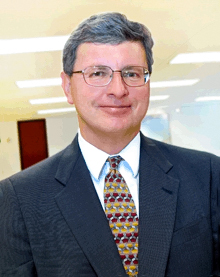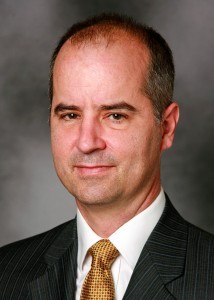By: Evan Walsh, Transcript Correspondent

Folks pay a lot for financial advice.
Ohio Wesleyan students who attended the eleventh annual Economic Outlook Conference on Nov. 17 didn’t have to. This Tuesday, a panel of prominent economists led a lecture and answered curious students’ questions about the future of the economy.
Students like junior Brooks Gilmore, an OWU Economics Management Fellow, were pleased they went.
“I’ve come every year I’ve been at OWU. I’ll come next year, too, because I think this is an opportunity for students to take advantage of a learning experience outside of class,” Gilmore said.
Like the name might suggest, the Economic Outlook Conference anticipates what we can expect our economy to do at a local, national and global level.
Their projections for economic success were predicated primarily on the rising levels of employment and the Federal Reserve controlling hyper-inflation to maintain the strength of the dollar.

Each of the three panelists were genuinely optimistic about the immediate and long-term success of the economy.
However, during the question and answer part of the conference they came to a disagreement about the extent to which the economy will grow and the effects of government policy.
Senior economist at Nationwide Economics Ben Ayers, compared the national gross domestic product with changing levels of employment.
His research validated his suspicion that employment and GDP are those forces most responsible for making our economy a consumer economy.
George Mokrzan, the director of economics at Huntington Trust agreed with Ayers’s assertion that employment across the country has helped the recovery process. Still, he noted that regional improvements in the “rustbelt,” as it still mistakenly called, are actually ahead of the national average.

Mark Schweitzer, senior vice president at the Federal Reserve Bank of Cleveland, was the last to present. He touched upon some of the previous comments with respect to the Federal Reserve policies that control the economy’s pace of recovery.
“The Volcker Rule and other monetary moves will slow inflation without hurting consumption,” Schweitzer said.
Some stuck around to speak with the panel members for their insight as professionals.
“Employment prospects for students are much higher now than they were a few years ago,” Mokrzan said. “There is still a premium on higher education, so stay in school.”
The conference, held in the Benes Room, was put together by the Woltemade Center with members of the economics department moderating.